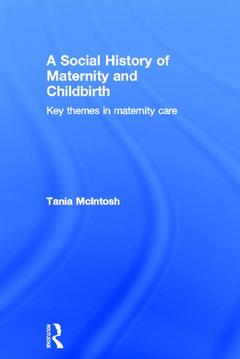A Social History of Maternity and Childbirth Key Themes in Maternity Care
Auteur : McIntosh Tania

People are fascinated by stories of childbirth, and the sources to document maternity in Britain in the twentieth century are rich and varied. This book puts the history of maternity in England into its wider social context, highlighting areas of change and continuity, and charting the development of pregnancy and birth as it emerged from the shadows and became central to social debate.
A Social History of Maternity and Childbirth considers the significance of the regulation and training of midwives and doctors, exploring important aspects of maternity care including efforts to tackle maternal deaths, the move of birth from home to hospital, and the rise of consumer groups. Using oral histories and women?s memoirs, as well as local health records and contemporary reports and papers, this book explores the experiences of women and families, and includes the voices of women, midwives and doctors. Key themes are discussed throughout, including:
- the work and status of the midwife
- the place of birth
- pain relief
- ante- and post- natal care
- women?s pressure groups
- high-tech versus low-tech
- political pressures.
At a time when the midwifery profession, and the wider structure of maternity care, is a matter for popular and political debate, this book is a timely contribution. It will be an invaluable read for all those interested in maternity care in England.
Introduction 1. Historiography and Comparisons: Introduction, Historiography of Midwifery, The Sociological Context of Maternity History, The International Context, Conclusion 2. 1902-1914: Introduction, Informing Ideologies? Eugenics and Physical, Deterioration, Delivering maternity care in 1902, Birth and death, Conclusion 3. 1915-1939: Introduction, Maternal mortality, Changing patterns of care, A state maternity service?, Hospital birth, Midwives, Conclusion 4. 1940-1960: Introduction, The Golden Age of District Midwifery?, GPs and Maternity Care, Reports and Arguments, Providing Analgesia 5. 1961-1980: Introduction, Scientific Birth, The Place of Birth, What Did Women Want?, The Response of the Service, Conclusion 6. 1981-2002: Introduction, Demonstrating for Change, Changing Childbirth, Research and Education, Obstetrics Triumphant? ConclusionAppendix 1: Main Government Legislation Relevant to Maternity Care Appendix 2: National Reports Relevant to Maternity Care
Tania McIntosh is Lecturer in Midwifery at the University of Nottingham, UK. Initially trained as an historian, Dr. McIntosh worked as a tutor in History at the University of Sheffield, until 2000 when she commenced midwifery training at the same university. Since then she has worked as a clinical midwife in Sheffield and at the City Hospital Nottingham. In 2009 she was one of the founders of De Partu, a national interdisciplinary research group for the history of midwifery and birth.
Date de parution : 03-2012
Ouvrage de 208 p.
15.6x23.4 cm
Date de parution : 03-2012
Ouvrage de 208 p.
15.6x23.4 cm
Thèmes d’A Social History of Maternity and Childbirth :
Mots-clés :
Direct Entry Midwife; services; Maternal Death Rate; care; Grantly Dick Read; home; Wider Issues; hospital; Sheila Kitzinger; district; MoH; midwives; Ante-natal Care; sheila; Puerperal Fever; kitzinger; District Midwives; midwifery; Perinatal Mortality Survey; maternal; GP Unit; childbirth control; Maternity Services; national health service; LGB; maternity historiography; Home Birth; England's maternity care; Large Families; RCM; Hospital Birth; Midwives Act; Antenatal Care; Marie Stopes; National Childbirth Trust; Active Birth Movement; Ante-Natal Clinic; Midwifery Research; Maternal Mortality



